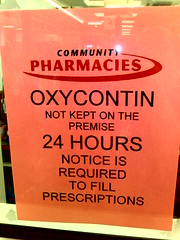Today’s issue of FiercePharma covered two interesting FDA decisions (or non-

decisions, if you prefer).
The first involves the FDA’s decision not to approve generic versions of Purdue’s Oxycontin:
The U.S. Food and Drug Administration today approved updated labeling for Purdue Pharma L.P.’s reformulated OxyContin (oxycodone hydrochloride controlled-release) tablets. The new labeling indicates that the product has physical and chemical properties that are expected to make abuse via injection difficult and to reduce abuse via the intranasal route (snorting).
Additionally, because original OxyContin provides the same therapeutic benefits as reformulated OxyContin, but poses an increased potential for certain types of abuse, the FDA has determined that the benefits of original OxyContin no longer outweigh its risks and that original OxyContin was withdrawn from sale for reasons of safety or effectiveness. Accordingly, the agency will not accept or approve any abbreviated new drug applications (generics) that rely upon the approval of original OxyContin.
Now we’re not big fans of some of the FDA’s decisions. And blocking generic entry is one decision that we’re not in favor of. However, we think the FDA is right with respect to Oxycontin and other highly abusable products.
Now contrast that with the situation with biosimilars:
Cipla, one of India’s leading generic pharmaceutical companies announces the launch of the first biosimilar of Etanercept in India; under the brand name ‘ETACEPT’ for the treatment of rheumatic disorders. Formed through a partnership alliance, ETACEPT is manufactured by a China-based company Shanghai CP Guojian Pharmaceutical Co. Ltd., which will be marketed by Cipla in India.
While the major players continue to fight tooth and nail to preserve their markets in the US, the country continues to fall behind “emerging” countries and their ability to offer innovative products and services at a substantially lower cost.
Medical tourism for surgical procedures is already a growing market. Will we come to the point where medical tourism will include RA? Cancer? Crohn’s?
Related articles
 FDA Affirms It Will Not Approve Any Generic Forms OxyContin Despite Patent Expiration
FDA Affirms It Will Not Approve Any Generic Forms OxyContin Despite Patent Expiration Cipla launches biosimilar for rheumatic disorders in India
Cipla launches biosimilar for rheumatic disorders in India Biosimilars to Cost More to Get to Market in US
Biosimilars to Cost More to Get to Market in US

